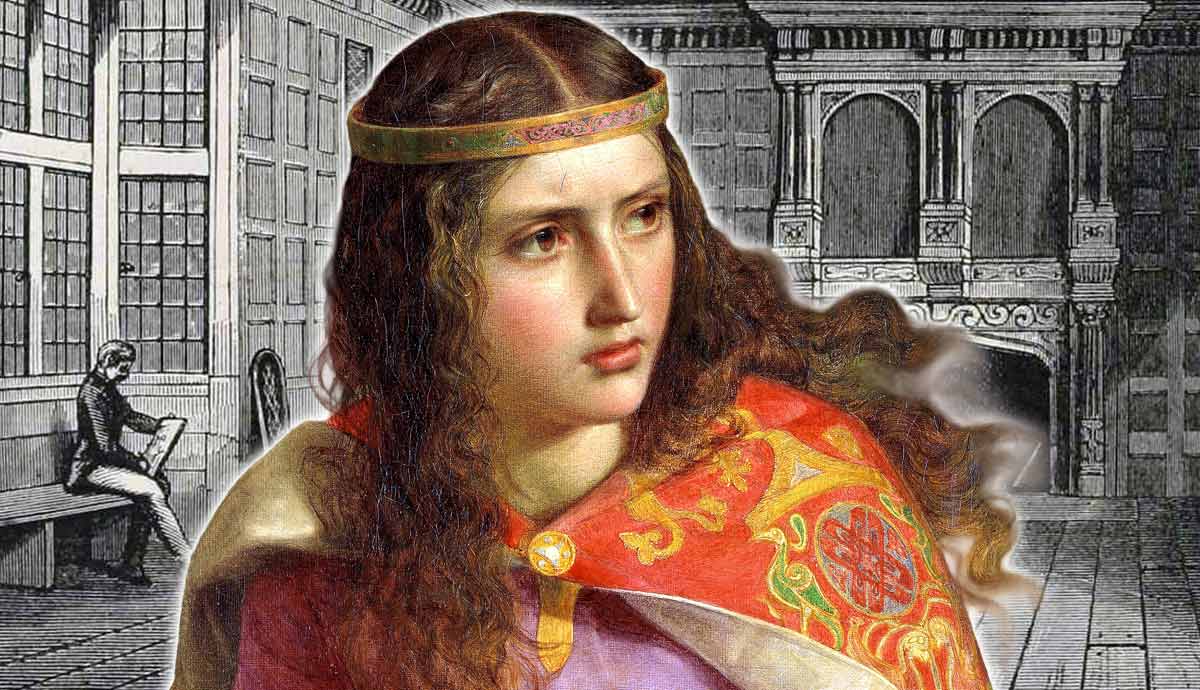
The Romans worshipped a pantheon of gods descended from the deities of ancient Greece, each one of whom presided over his own domain and had special areas of expertise. Many of their names are familiar to us now from mythology, astronomy, and modern terminology. Some people even give god names to their children. Read on to find out more about ten Roman god names that have developed across the centuries and remain popular today.
Roman God Names About The Earth And Cosmos
Many ancient Roman gods presided over natural or cosmological elements in mythology, such as the sea, the sky, or bountiful harvest. These Roman God names were transposed and reused throughout history, and some are still very popular today.
Jupiter

The king of the deities and god of lightning, Jupiter sat at the head of the Roman pantheon from its earliest days until paganism was largely overthrown by Christianity. According to classical mythology, his father Saturn had been warned that one of his children would overthrow him, and so he came up with the ingenious solution of eating them. After he had swallowed up Neptune, Pluto, Ceres, Juno, and Vesta, his wife came up with a plan to hide her next child in Crete. After growing up on the island, Jupiter sought revenge on his father, forcing him to vomit out all his siblings, who then joined ranks and overthrew the old gods, known as the Titans.
When the cosmos were being divided up, the heavens were allocated to Jupiter, the seas to Neptune, and the underworld to Pluto. From that point onwards, Jupiter reigned over the skies alongside his wife (and sister) Juno. Jupiter is the Roman name and counterpart of Greek Zeus, and is one example of how god names were used to Romanize their Greek predecessors. Like Zeus, he is often depicted as grasping a lightning bolt or with his sacred animal, the eagle, which became the primary symbol of the unconquerable Roman army.
Roman names like Jupiter have always been associated with almighty power and force of will, and as a result, has often been used in a military context to convey might and strength. The British Navy, for example, has had six ships named HMS Jupiter, while the United States Navy has had two USS Jupiters. Similarly, the planet Jupiter is by far the largest in our solar system and even the ancients identified the faint light in the night sky with the king of the gods.

Although increasingly rare, Jupiter has been used as a given name, most famously of the poet Jupiter Hammon. Hammon was born into slavery on Long Island at the beginning of the 18th century, where he learned to read and write, eventually publishing his first poem at the age of 49. As the first black poet to be published in North America, Hammon is often considered the father of African-American literature, making his first name particularly fitting.
Saturn

The infamous father of Jupiter and one of the Titans, Saturn represented renewal, growth, and plenty. While ancient literature varies greatly on the matter, Saturn’s reign was often considered a time of peace and abundance, when humans lived in harmony with the natural world. Although this might seem somewhat at odds with the image of the god devouring his own children, Saturn was certainly celebrated in ancient Rome, where the annual Saturnalia festival was filled with feasting, revelry, and role-play.

The planet Saturn was associated with the god in antiquity; being the furthest planet away, the Romans may even have named it after the ousted leader as a reference to his exile from the heavens. While Saturday too is derived from the name of the god, originally known as Saturni Dies (‘Saturn’s Day’), the Roman days of the week were not directly given god names, but rather after the planets that took their Roman names from them. The Romans believed that the various planets had certain effects on specific hours of each day. From the planet, we also have the adjective ‘saturnine’, meaning gloomy or sluggish. Medieval astrologers believed that those under the influence of Saturn would display these traits.
Vulcan

Vulcan was the god of fire, volcanoes and the forge, and was lucky enough, according to some branches of myth, to be married to Venus, the goddess of love. The Roman counterpart to the Greek god Hephaestus, he was celebrated at an annual festival held in the middle of summer and particularly celebrated by blacksmiths and craftsmen. Legend had it that Juno, aghast at the ugliness of her newborn son, tried to rid herself of the baby Vulcan by throwing him into a volcano. Rather than burning to a crisp, however, he became the ultimate blacksmith, skillfully crafting armor, jewelry, and, most importantly, Jupiter’s thunderbolts.
Volcanoes were henceforth given Roman names after the deity who had the power to utilize their fires and turn them to art. Likewise, the term vulcanist means metal-worker, a direct reference to the blacksmith god. Moreover, as any Star Trek fan will be aware, the iconic Mr. Spock is a Vulcan, whose home planet was characterized by harsh heat and mountainous terrain. Interestingly, Vulcan does still exist as a name, most often a surname and found particularly in Romanian.
Sol

Brother to the goddess of dawn, Aurora, and the goddess of the moon, Luna, Sol was the divine personification of the sun. He and his sister were given god names that were simply the Latin word for the celestial objects they represented. The origins of the cult of Sol are complicated, with some scholars arguing for two separate deities, but it is clear that he was worshipped in the city of Rome, where there was an ancient temple to the god and annual sacrifices were made in his honor.
In the present, Sol is not an uncommon name, belonging to roughly 10,000 American citizens. Its popularity reached a peak towards the beginning of the 20th century, but it has not fallen out of favor since. However, in most of these cases, Sol is short for Solomon rather than the Roman name after the ancient god! The classical origins are nonetheless preserved in a wealth of modern vocabulary, such as ‘solar,’ ‘solstice,’ and even ‘sun’ itself.
Pluto

The unfortunate brother of Jupiter and Neptune, Pluto inherited the underworld as his domain. Like his Greek equivalent Hades, Pluto was consigned to the land of the dead to preside over the spirits of the deceased. The most famous mythological story about Pluto involved his abduction and marriage to Ceres’ daughter Persephone, who was fated to spend six months with him in the underworld but was free to enjoy the other six months in the world above. The god was often conflated with the Greek personification of wealth, Ploutos, and therefore he found slightly more favor with the Romans, who set up shrines in the hope of winning his favor and ensuring their material prosperity.
An interesting story surrounds the naming of the solar system’s smallest planet, named after the god. When it was discovered in 1930, a young girl named Venetia Burney told her uncle, an academic, that it be named Pluto, after the god who was able to make himself invisible. Her uncle passed this suggestion on to his colleagues in astronomy and the name was formally adopted later that year.
Only a few months later, Mickey Mouse’s canine sidekick was officially given the name Pluto too. While some of the animators involved claim that it was simply for want of an alliterative name (Pluto the Pup), others believe that Walt Disney wanted to capitalize on the media coverage that was being lavished on the newly-discovered planet. And so, while it is practically non-existent as a given name, the name of the ancient Roman god lives on in the far more loveable cartoon dog!
Lucifer

The planet which we now know as Venus was known by several names in antiquity. When referred to as the morning star, it was Venus, as the evening star it was known as Vesper, and when personified as a masculine deity, it was called Lucifer. Literally meaning ‘bringer of light’, Lucifer was thought to be the son of Aurora, goddess of dawn, and like his mother, would herald the arrival of the new day in his fiery chariot. There was debate in antiquity about whether such wandering stars should truly be counted among the gods. Certainly, they held a far less prestigious place than the likes of Jupiter, Neptune or Pluto, but nonetheless had a role to play in minor myths and ceremonies.
The name Lucifer will be far more familiar to most people because of its Judeo-Christian significance. The scripture gives numerous names for the Devil, and the matter is only complicated further by the many translations that the work has gone through over the centuries, but the term ‘Lucifer’ appears only once in the pages of the Bible. It is found in Isaiah 14:12, when the impious King of Babylon is sarcastically referred to as ‘light-bringer’ and is told that he has fallen from God. This was later interpreted as a reference to Satan’s exile from heaven, and it thus came to be believed that Lucifer was the name of Satan before the fall.

The satanic associations of the name have not deterred parents from giving their children the name Lucifer, although such an attempt was prohibited in Germany. In fact, a surprising 26 newborn boys were called Lucifer in 2018! Perhaps these new parents have been inspired by the recent television series Lucifer, in which the eponymous protagonist is portrayed as a suave and charming (although undeniably demonic) character. It may be reassuring to anyone with this name to know that its original meaning was not at all satanic, but actually connected with light and renewal.
Roman God Names Connoting War, Desire, Commerce and Indulgence
While some ancient Roman gods were anthropomorphized versions of nature and the cosmos, some ruled over concepts and ideologies from the time. These included warfare, violence, love, travel, and motherhood. Below are some modern god names taken from Roman deities.
Mercury

The Roman equivalent of the Greek god Hermes, Mercury was responsible for messages, traveling, commerce, and trickery. It is thought that his name could be derived from the Latin word merx, meaning ‘goods’ or ‘wares’, which is also where the modern word ‘merchant’ comes from. On his winged sandals he would fly about the world, serving as a messenger between gods and mortals, and was also in charge of leading the souls of the departed down into the underworld.
The chemical element mercury was named after the trickster god, whose mobility and speed made him the perfect namesake for the only metal to be liquid at room temperature. Similarly, the planet Mercury, which is the quickest to travel around the sun, took its name from the flighty god.
While Mercury is sometimes given as a first name, it has become most prominent as a surname, made famous by the lead singer of Queen. More commonly, it is found in the European derivation of Mercurio, which is shared by several thousand people worldwide.
Mars

Mars was the ancient god of war, the Roman equivalent to Ares. Worshipped in particular by soldiers, he was the center of several religious festivals held at the beginning and end of the military campaigning season. Like Venus, he held an important position in Roman history, as he was traditionally considered the father of Romulus and Remus, the twin boys suckled by a she-wolf who would go on to found the eternal city. This gave extra significance to the famous love affair between Venus and Mars, since it reconciled the two mythical foundations of Rome.
The modern military term ‘martial’ is derived from the name of the war god, as is the month of March, which was when the Roman army set out on its latest campaigns. As a name, it is most commonly found now as a surname: Bruno Mars took it on as a stage-name, having actually been born Peter Hernandez! Some celebrities have even used it as a given name, including soul artist Erykah Badu, whose daughter shares her name with the Roman god.
Cupid

Cupid is one of the Roman god names that derives from the personification of an abstract noun. In Latin, the word cupido means lust, passion, or desire, all of which are represented in the god of the same name. Cupid was the son of Venus, goddess of love, and of Mars, god of war, and he combined their traits to manipulate and generate powerful emotions and affections, with the aid of his trusty bow and arrows. The story of Cupid and Psyche explores what happens when the god is wounded by his own weapons and undergoes the torments of love.

From antiquity onwards, the figure of Cupid has been a constant presence in art, literature, and language, in everything from commercial advertising to allegorical artwork. In the modern dictionary, the term ‘cupidity’ refers to overwhelming or violent desire or greed, reflecting the passionate longing represented by the Roman god. Remarkably, there are roughly 135 people in the USA who actually have the Roman name Cupid, either as their first name or surname.
Bacchus

The Roman counterpart to the Greek god Dionysus was Bacchus, who presided over the grape-harvest and all that it entailed. Wine-making, drinking, and revelry all fell under the domain of this fun-loving god, who was held responsible for indulgence, religious ecstasy, and madness, particularly in women. There were a great number of ceremonies held in honor of Bacchus, and in 186 BC, the Bacchanalia festival became so raucous that the senate interpreted it as a conspiracy to overpower them, leading to legislation that mitigated the celebration and cult of Bacchus.

In modern parlance, the adjective ‘Bacchic’ is still used in relation to the god, referring to the drunken and debaucherous behavior of those who may have indulged a little too much in the fruits of his patronage. While it is perhaps no surprise that parents have generally refrained from naming their sons after the deity of wine, the name remains in use as a surname, shared by several thousand people in the United States alone.
More On Roman God Names
Roman god names continue to influence and inspire the way we live today, from the way we describe drunken revelry to the names we give our children. Click here to discover more about Roman names, with the Ancient Goddesses and Roman Emperors.










